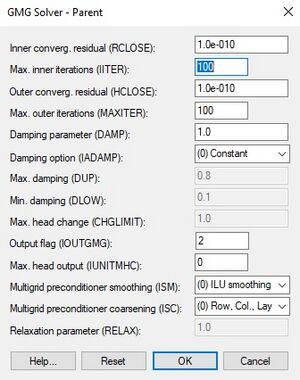GMS:GMG Package
From XMS Wiki
| MODFLOW | |
|---|---|
| Pre-processing | |
| MODFLOW Commands | |
| Building a MODFLOW Model | |
| Map to MODFLOW | |
| Calibration | |
| Packages Supported in GMS | |
| Saving a MODFLOW Simulation | |
| Importing MODFLOW Files | |
| Unsupported MODFLOW Features | |
| Run MODFLOW | |
| Post-processing | |
| MODFLOW Display Options | |
| MODFLOW Post-Processing Viewing Options | |
| Reading a MODFLOW Simulation | |
| Tutorials | |
| Packages | |
| Flow: | BCF6, HUF, LPF, UPW |
| Solvers: | SMS |
| Other: | UZF1 |
The GMG package is one of the solver packages for MODFLOW supported by GMS. The GMG solver is an iterative solver based on a multi-grid approach.
Parameters include:
- Inner convergence residual (RCLOSE) – The algorithm computes the l2-norm of the residual and compares it against RCLOSE.
- Maximum inner iterations (IITER) – For each linear solution. The default is 100. Specify a smaller number for nonlinear problems to prevent an excessive number of inner iterations.
- Outer convergence residual (HCLOSE) – For nonlinear problems. After each linear solve (inner iteration), the maximum norm of the head change is compared against HCLOSE. Can be set to a large number for linear problems. Ignored if Maximum outer iterations is 1.
- Maximum outer iterations (MAXITER) – Also referred to as MXITER. For linear problems, set to 1. For nonlinear problems, set to a higher number though it is usually unnecessary to go above 100.
- Damping parameter (DAMP) – A value of 1.0 should be used for linear problems. For nonlinear problems, a value less than 1.0 but greater than 0.0 may be necessary to achieve convergence.
- Damping option (IADAMP) – Flag that controls adaptive damping. Contains the following options:
- "(0) Constant"
- "(1) Cooley adaptive"
- "(2) RRR adaptive"
- Maximum damping (DUP)
- Minimum damping (DLOW)
- Maximum head change (CHGLIMIT)
- Output flag (IOUTGMG) – Flag that controls the output of the GMG solver. Values can be 0–4.
- 0 = Only the solver inputs are printed.
- 1 = For each linear solve, prints the number of PCG iterations, the value of the damping parameter, the l2-norm of the residual, and the maximum norm of the head change and its location (column, row, layer). At the end of a time/stress period, the total number of GMG calls, PCG iterations, and a running total of PCG iterations for all time/stress periods are printed.
- 2 = The convergence history of the PCG iteration is printed, showing the l2-norm of the residual and the convergence factor for each iteration.
- 3 = Same as 1 except the output is sent to the terminal instead of the output file.
- 4 = Same as 2 except the output is sent to the terminal instead of the output file.
- Maximum head output (IUNITMHC)
- Multi-grid preconditioner smoothing (ISM)
- Multi-grid preconditioner coarsening (ISC)
- Relocation parameter (RELAX)
For more info on the GMG solver look at the following document:
- Wilson, John D., and Richard L. Naff. MODFLOW-2000, The US Geological Survey Modular Ground-Water Model--GMG Linear Equation Solver Package Documentation. No. 2004-1261. 2004. [1]
| GMS – Groundwater Modeling System | ||
|---|---|---|
| Modules: | 2D Grid • 2D Mesh • 2D Scatter Point • 3D Grid • 3D Mesh • 3D Scatter Point • Boreholes • GIS • Map • Solid • TINs • UGrids | |
| Models: | FEFLOW • FEMWATER • HydroGeoSphere • MODAEM • MODFLOW • MODPATH • mod-PATH3DU • MT3DMS • MT3D-USGS • PEST • PHT3D • RT3D • SEAM3D • SEAWAT • SEEP2D • T-PROGS • ZONEBUDGET | |
| Aquaveo | ||
This article is a [stub]. You can help xmswiki by expanding it.
Retrieved from "https://www.xmswiki.com/index.php?title=GMS:GMG_Package&oldid=107654"
Hidden category:
